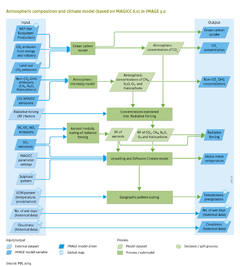Atmospheric composition and climate: Difference between revisions
Jump to navigation
Jump to search
Oostenrijr (talk | contribs) No edit summary |
Oostenrijr (talk | contribs) No edit summary |
||
| Line 7: | Line 7: | ||
|InputVar=BC, OC and NOx emissions; SO2 emissions; CO and NMVOC emissions; Non-CO2 GHG emissions (CH4, N2O and Halocarbons); CO2 emission from energy and industry; Land-use CO2 emissions - grid; NEP (net ecosystem production) - grid; Number of wet days - grid; Cloudiness - grid; | |InputVar=BC, OC and NOx emissions; SO2 emissions; CO and NMVOC emissions; Non-CO2 GHG emissions (CH4, N2O and Halocarbons); CO2 emission from energy and industry; Land-use CO2 emissions - grid; NEP (net ecosystem production) - grid; Number of wet days - grid; Cloudiness - grid; | ||
|Parameter=MAGICC parameter settings; Radiative forcing factors; GCM pattern (temperature, precipitation) - grid; Sulphate pattern - grid; | |Parameter=MAGICC parameter settings; Radiative forcing factors; GCM pattern (temperature, precipitation) - grid; Sulphate pattern - grid; | ||
|OutputVar= | |OutputVar=CO2 concentration; Non-CO2 GHG concentrations; CO2 concentration; Radiative forcing; Global mean temperature; Temperature - grid; Precipitation - grid; Ocean carbon uptake; Number of wet days - grid; Cloudiness - grid; | ||
|Description=Climate change is considered to be one of the most important effects of human activities on the environment. Emissions from fossil fuels, industry, land use and land-use change have increased greenhouse gas concentrations and led to almost 1 °C rise in global mean temperature on pre-industrial levels ([[IPCC, 2007a]]; [[IPCC, 2013]]). The impacts are already visible and are expected to increase in the coming century. Without further action, mean global temperature could increase by 2.6 – 4.8 °C (5-95 percentile, RCP8.5) by the end of this century ([[IPCC, 2013]]). Climate change impacts manifest themselves in all world regions, and affect almost all aspects of human activity. | |Description=Climate change is considered to be one of the most important effects of human activities on the environment. Emissions from fossil fuels, industry, land use and land-use change have increased greenhouse gas concentrations and led to almost 1 °C rise in global mean temperature on pre-industrial levels ([[IPCC, 2007a]]; [[IPCC, 2013]]). The impacts are already visible and are expected to increase in the coming century. Without further action, mean global temperature could increase by 2.6 – 4.8 °C (5-95 percentile, RCP8.5) by the end of this century ([[IPCC, 2013]]). Climate change impacts manifest themselves in all world regions, and affect almost all aspects of human activity. | ||
Revision as of 11:01, 1 July 2014
Parts of Atmospheric composition and climate
| Component is implemented in: |
|
| Related IMAGE components |
| Projects/Applications |
| Models/Databases |
| Key publications |
| References |
Key policy issues
- What would be the impact of global climate change in this century without additional mitigation policies and measures?
- To what extent would the various scenarios to significantly reduce net greenhouse gas emissions lead to a reduction in climate change?
- To what extent does the uncertainty of geographical patterns in temperature and precipitation change influence future climate impacts and response strategies?
